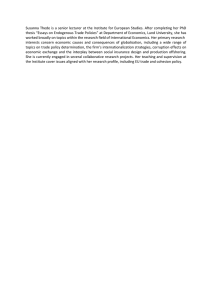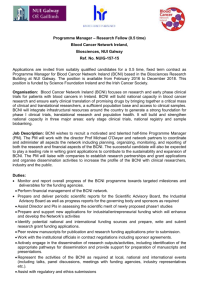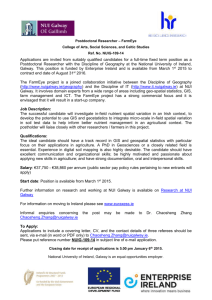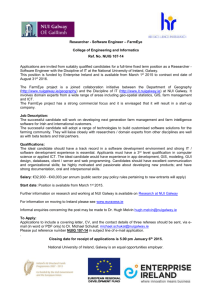Document 14838677
advertisement
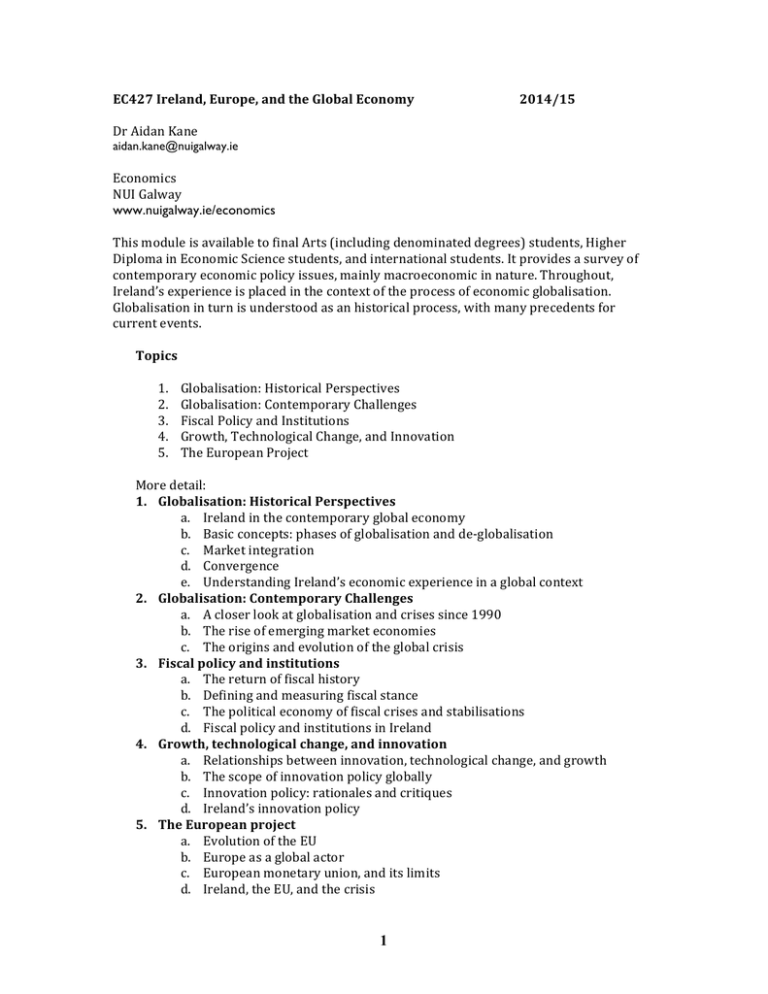
EC427 Ireland, Europe, and the Global Economy Dr Aidan Kane 2014/15 aidan.kane@nuigalway.ie Economics NUI Galway www.nuigalway.ie/economics This module is available to final Arts (including denominated degrees) students, Higher Diploma in Economic Science students, and international students. It provides a survey of contemporary economic policy issues, mainly macroeconomic in nature. Throughout, Ireland’s experience is placed in the context of the process of economic globalisation. Globalisation in turn is understood as an historical process, with many precedents for current events. Topics 1. Globalisation: Historical Perspectives 2. Globalisation: Contemporary Challenges 3. Fiscal Policy and Institutions 4. Growth, Technological Change, and Innovation 5. The European Project More detail: 1. Globalisation: Historical Perspectives a. Ireland in the contemporary global economy b. Basic concepts: phases of globalisation and de-­‐globalisation c. Market integration d. Convergence e. Understanding Ireland’s economic experience in a global context 2. Globalisation: Contemporary Challenges a. A closer look at globalisation and crises since 1990 b. The rise of emerging market economies c. The origins and evolution of the global crisis 3. Fiscal policy and institutions a. The return of fiscal history b. Defining and measuring fiscal stance c. The political economy of fiscal crises and stabilisations d. Fiscal policy and institutions in Ireland 4. Growth, technological change, and innovation a. Relationships between innovation, technological change, and growth b. The scope of innovation policy globally c. Innovation policy: rationales and critiques d. Ireland’s innovation policy 5. The European project a. Evolution of the EU b. Europe as a global actor c. European monetary union, and its limits d. Ireland, the EU, and the crisis 1 Reading The readings in this course are central: there is no one textbook, but a variety of readings, are drawn from academic and policy literatures, and all of these will be available online via the Blackboard system. You are automatically registered for Blackboard when you complete student registration, so do attend to that. A reading list is below, and this will be supplemented as the course proceeds (likely about 2 or 3 more readings per topic). I strongly encourage you to keep informed of global, European and Irish economic developments throughout this course (and beyond). From time to time, I’ll point to relevant resources, particularly online, in this regard. Assessment A term paper (around 1,500 words) will account for 30% of the marks in this course (I’ll provide details of this by Week 3). This may involve some group work to help you, but it is not a group project. The end of Semester examination accounts for the remainder of the marks. Sample questions, mainly comprising short or medium sized essay-­‐style questions, will be provided in advance to help you guide your study for this exam. Any travel or other plans must reckon with the fixed Semester I exam period: alternative end-­‐year exam arrangements for different groups are not possible. Engaging with economics In my role as director of undergraduate studies in economics, I’ve prepared a short handbook for undergraduate economics students at NUI Galway to help guide you in your studies. See: www.nuigalway.ie/economics/current Attendance at lectures is obligatory: slides on Blackboard do not substitute for your attendance, your note-­‐taking, and/or participation. If you unavoidably miss lectures, it is your responsibility to check with fellow students on the material covered, and any organisational announcements made. Contact details It often works best to arrange at lectures to make an appointment, or feel free to email me at: aidan.kane@nuigalway.ie My office is Room 206, first floor, in the St Anthony’s (i.e., the older) part of the Cairnes Building. 2 Reading Each reading will shortly be available online on the Blackboard system. I will provide guidance on readings in lectures, and I will add further readings to this list, in particular some policy and academic literature which has recently emerged: likely about 2 to 3 articles more per topic. 1. Globalisation: Historical Perspectives Persson, K. G. (2010). Globalization and its challenge to Europe. In An Economic History of Europe: Knowledge, Institutions, and Growth, 600 to the Present, chapter 12, pages 221–241. Cambridge University Press. O’Rourke, K. H. (2003). Ireland and the bigger picture. In Dickson, D. and Ó Gráda, C., editors, Refiguring Ireland : Essays in honour of L M Cullen, pages 342–355. Lilliput Press, Dublin. Ó Gráda, C. and O’Rourke, K. H. (2000). Living standards and growth. In O’Hagan, J. W., editor, The Economy of Ireland: Policy and Performance of a European Region, chapter 7, pages 178–204. Gill & Macmillan, Dublin, 8th edition. 2. Globalisation: Contemporary Challenges OECD (2010a). Shifting wealth and the new geography of growth. In Perspectives on Global Development 2010: Shifting Wealth, chapter 1, pages 23–42. OECD, Paris. OECD (2010b). The Asian giants and their macroeconomic impact. In Perspectives on Global Development 2010: Shifting Wealth, chapter 2, pages 43–66. OECD, Paris. Almunia, M., Bénétrix, A., Eichengreen, B., O’Rourke, K. H., and Rua, G. (2010). From great depression to great credit crisis: similarities, differences and lessons. Economic Policy, pages 219–265. [Note: only up to end of Section 3 on page 34 required reading here.] O’Rourke, K.H. and A.M. Taylor Cross of Euros, Journal of Economic Perspectives 27(3): 167-­‐ 192. Teulings C. and Baldwin, R. Secular Stagnation: Facts, Causes and Cures. VoxEU.org eBook, Centre for Economic Policy Research (CEPR) London 2014. Stull G. Future Directions for the Irish Economy. (Conference Proceedings) European Economy Economic Papers 524 July 2014, European Commission, DG for Economic and Financial Affairs. 3. Fiscal Policy and Institutions Henriksson, J. (2007). Ten Lessons About Budget Consolidation. Breugel Essay and Lecture Series, Brussels. Lane, P. R. (2009). A new fiscal strategy for Ireland. Economic and Social Review, 40(2):233– 253. Lane, P. R. (2010). A new fiscal framework for Ireland. IIIS Discussion Paper No. 315. Lane, P.R. (2012) The European Sovereign Debt Crisis. Journal of Economic Perspectives, 26(3): 49–68 3 4. Growth, Technological Change, and Innovation Greenhalgh, C. and Rogers, M. (2010). The nature and importance of innovation. In Innovation, Intellectual Property, and Economic Growth, chapter 1, pages 3–31. Princeton University Press, Princeton and Oxford. Jones, C. I. (1998). The economics of ideas. In Introduction to Economic Growth, chapter 4, pages 71–88. W. W. Norton, New York and London, 2nd edition. Kane, A. (2001). Rationales for science, technology, and innovation policy. mimeo, Department of Economics, NUI Galway. Mokyr, J. (1992). Understanding technological progress. In The Lever of Riches: Technological Creativity and Economic Progress, chapter 7, pages 152–191. Oxford University Press, Oxford and New York. 5. The European Project Eichengreen, B. and Boltho, A. (2010). The economic impact of European integration. In Broadberry, S. and O’Rourke, K. H., editors, The Cambridge Economic History of Modern Europe, volume 2: 1870 to the Present, chapter 11, pages 267–295. Cambridge University Press, Cambridge. Baldwin, R. and Wyplosz, C. (2004). Optimum currency areas. In The Economics of European Integration, chapter 13, pages 329–356. McGraw-­‐Hill, New York and London. 4 EC427 Ireland, Europe, and the Global Economy 2014/15 Dr Aidan Kane Economics NUI Galway aidan.kane@nuigalway.ie Term paper This term paper accounts for 30% of your marks in this course. I have a number of objectives in setting this paper: • to give you an opportunity to get credit in this course, other than by the final written exam, • to provide an assignment which will focus you on at least one of the core topics of the course, partly in preparation for the final exam. Themes and titles The requirement is for an individual term paper of 1,500 words (not including the bibliography). Your paper should fall within one of ten general themes set out below, but will have a more specific focus—and title—which you choose. Some guidance on choosing a title within the themes is also given below. There are two submission requirements: a one-page outline in Week 7, and the term paper itself in Week 11. Submission of outline: 4pm Friday 24th October 2014 i.e., end Week 7 of Semester I You will submit a one-page hard copy outline of your proposed work by the above deadline. I’ll accept these outlines in class that week, and you can leave it in the assignments cabinet for economics, which is on the first floor of the St. Anthony’s part of the Cairnes Building, to the north of the main building, at any stage during that week. I will not accept these by email. Please keep this to strictly one page only i.e., no cover page. This one-page outline should include: 1. your chosen theme from the ten given below, 2. the specific title you’ve chosen for your paper, within that theme 3. a 200 word abstract (i.e., summary) of your proposed paper, 4. the titles of the main section headings of your paper (about 6 or 7), 5. a short list of some of the sources/bibliographical references you will use. 1 Submission of the final paper: 4pm Friday 21th November 2014, i.e., end of Week 11 of Semester I I may not accept, or credit, late submissions. Each person will submit one hard copy version (not email) by the deadline, and will be asked to sign for it, in Claire Noone’s office—Room 238, first floor, in the older (St Anthony’s) part of the Cairnes Building. Themes for your term paper You should decide which one of the following 10 broad themes your term paper is aligned with, and then decide on a specific title for your paper. 1 2 3 4 5 6 7 8 9 10 Globalisation, history and the crisis The crisis in Europe: causes, evolution and policy responses Secular stagnation Emerging markets and the global crisis The ‘austerity’ debate Sovereign debt default and restructuring The design of fiscal institutions The role of innovation policy in boom and bust Flaws in the design of the euro-zone The rescue of banking systems The level expected is that of an informed policy discussion: that is, consistent with the level of the course, I’m not expecting advanced theory or new statistical analysis. That said, some students can ‘raise the bar’ on the more advanced material, so long as it fits well with the overall paper. Working up a title for your term paper Some options for generating a specific title for your term paper within the theme you’ve chosen are: • • • • • • • An account of one particular theoretical approach to the question A focus on measurement issues A closer look at some particular data set (graphically or using tables) An exercise in data analysis (i.e., slightly more advanced than the last) What are policy makers doing/saying/what are the policy options? A cross-country analysis A focus on Ireland: does Ireland fit into the overall picture? The paper does not have to focus specifically on Ireland: but it might help in structuring it if you include an option to discuss the Irish case. Note that for most topics, it will help to think in terms of including one or two data tables or graphs (as a rule of thumb, perhaps up to one page of these elements, if relevant). It might also help to think of your title as 2 posing a particular question which your essay can help answer, or least set out a few possible answers. Criteria for assessment In assessing your term paper I’ll consider: • • • • • The quality of a short (200 words max) abstract at the start which sets out how your paper addresses the title you’ve arrived at. The logic of the design/arrangement of the paper. Whether the paper has been presented professionally i.e., laid out clearly and simply, lack of typographical errors/spelling mistakes, a consistent approach to referencing and sources in tables etc. The clarity of writing throughout. The quality of the sources used (see next section in this document). I’ll post some useful resources and guides in the “Term Paper” folder on Blackboard and discuss this from time to time in class. Sources For a term paper of this size, I’d suggest that you first find about 10 key readings i.e., policy papers, academic journal articles, chapters in longer documents, of academic quality. The paper itself might ultimately draw upon only 5 or 6 of these in any detail, but it’s useful to “cast your net” a bit more widely initially. The citation/referencing style should be within the ‘Harvard’ style, i.e., the ‘author/date’ system. The following organisations will generally have a variety of high-quality research work in economics available on-line. Look particularly for ‘working papers’ series. These are draft articles made available for distribution and for comments, before they are formally published in academic journals. These sites also often have extensive statistical databanks which you might usefully explore for this paper. VOXeu http://www.voxeu.org An excellent place to begin: extensive discussion of macroeconomic policy issues by economists, generally linked to new academic research, but presented in a reasonably accessible way via short articles. Journal of Economic Perspectives http://www.aeaweb.org/jep/ Top quality academic discussion on policy issues: this journal is now accessible freely online.e www.imf.org The International Monetary Fund 3 (see particularly the annual World Economic Outlook (WEO), the Global Financial Stability Report (GFSR), and the Fiscal Monitor.) www.worldbank.org The World Bank The European Central Bank www.ecb.int (See the ‘publications’ section, and within that, the section on ‘Research, occasional, and legal papers’) Bruegel www.bruegel.org This is a Brussels-based economics think-tank with a focus on Europe. My colleague Professor Alan Ahearne is a member and contributor. www.cer.org.uk Centre for European Reform This is a UK based think-tank. NBER www.nber.org This is the National Bureau of Economic Research at Harvard, one of the foremost economics research institutes in the world. The working papers are available to subscribers only: NUI Galway is a subscriber, so you should be able to access this from any machine on campus, or by logging in to your Library account when off-campus. JSTOR http://www.jstor.ac.uk A vast archive of academic journal articles, including those in economics. NUI Galway has a subscription via the Library. Science Direct www.sciencedirect.com This is the web site of Elsevier, a major publisher of academic journals, across all subjects. Again, it’s a service for which NUI Galway has a subscription. The Economist magazine www.economist.com Their blogs are especially useful: ‘free exchange’ is the one focussed most on economics. Google Scholar http://scholar.google.com A great search engine for academic work. If you access it from a machine connected to the campus network, it’ll tell you when the ‘full-text’ of an article can be accessed. www.centralbank.ie www.cso.ie www.esr.ie www.irisheconomy.ie www.finance.gov.ie www.ntma.ie www.nama.ie Central Bank of Ireland Central Statistics Office Economic and Social Review (journal) Irish Economy blog Department of Finance National Treasury Management Agency National Asset Management Agency AK September 2014 4
